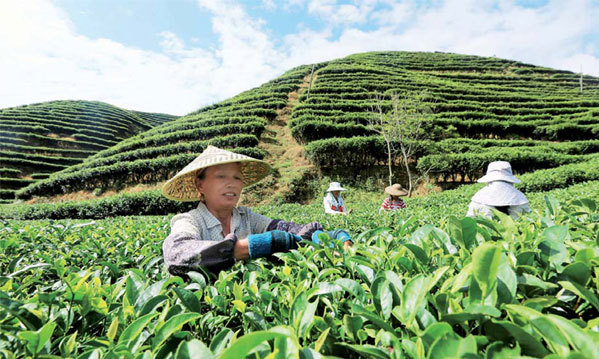Testing time for China's tea growers
By Todd Balazovic and Li Aoxue ( China Daily ) Updated: 2013-12-02 07:39:14|
Farmers picking tea leaves in Dongling village, Liuzhou city, in the Guangxi Zhuang autonomous region. Tan Kaixing / For China Daily |
Auction power
While finding someone willing to pay up to four times the price for a block of tea may be difficult, one auction house in Africa has answered the call of tea aficionados from across the globe.
The Mombasa Tea Auction house is one of the most famous in the world, selling teas from across the continent to buyers in the US, Europe and Asia, supplying to big names such as Lipton in a traditional live auction format.
Facing the opposite problem as China - Kenya is the third-largest producer of tea globally, with very little demand domestically - the auction house is now revamping the process to allow international bidders the chance to take part in an e-auction.
The plan is designed to expand the reach of the world's largest tea auction house, matching distributors with buyers at a price both can agree on.
While Western consumers may be perceived as having a less-sophisticated view of tea drinking, the US and Europe are mass consumers - with US citizens alone sipping more than 79 billion servings in 2012, according to statistics from the Tea Association of the USA.
They help fuel an international tea market worth more than $30 billion a year worldwide.
But unlike in China, where tea is the center of many social functions, from gatherings with friends to traditional marriage ceremonies, Americans and Europeans often view it as a cheaper, easy alternative to coffee.
More than 50 percent of the $10 billion annual tea sales in the US last year were ready-to-drink beverages. The pre-prepared bottled tea drinks selling for $1 to $2 a bottle in US grocery stores accounted for $4.8 billion in sales, according to numbers from the Tea Association of the USA.
It was the flourishing success of on-the-go drinks in the US that pushed drinks giant the Coca-Cola to phase out an agreement with Nestle's Nestea last year, instead refocusing efforts to capitalize on the trend in Europe, where traditional teabags still dominate the market.
One report, by research company MarketsandMarkets, estimates that by 2017, ready-to-drink tea and coffee sales will make up a $125 billion global industry.
|
|
|
|
|
|
|
|






















 Raymond Zhou:
Raymond Zhou: Pauline D Loh:
Pauline D Loh: Hot Pot
Hot Pot Eco China
Eco China China Dream
China Dream China Face
China Face





